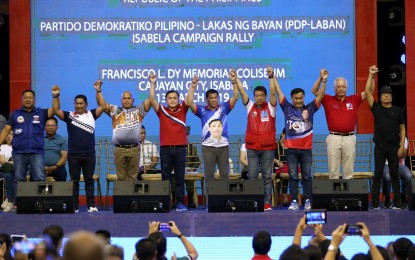
(File photo)
MANILA – Around this time of a pre-general election year like 2022, Filipino voters, young and old, become very busy debating and arguing over whom they will choose to lead them as president and vice president for the next six years.
At the same time, there is usually an exodus of the so-called "political butterflies" or candidates who can easily change the colors of their attires so they can choose the most flowery political party--normally that of the leading candidates for the top two elective posts in the country.
There is another term for these smart-minded groups of politicians: political turncoats. They usually show up during the last months before an election, like this coming May 9, 2022.
In the 2016 general polls, for instance, there had been a mass movement of political butterflies/turncoats to the camp of then leading presidential candidate Rodrigo Roa Duterte in the final stretch of the campaign.
Such a mass transfer to the leading political camp is possible due to the absence of any prohibition in the 1987 Constitution, unlike in the 1973 Charter that it replaced.
The 1987 Charter encourages the formation of new political parties as can be gleaned from its Article IX (Constitutional Commissions), Section 6, Paragraph C on the Commission on Elections (Comelec) which reads: "A free and open party system shall be allowed to evolve according to the free choice of the people."
In addition, the present charter, under Section 5, Article VI (Legislative Department) provides that: "The House of Representatives shall be composed of not more than 250 members, unless otherwise fixed by law, who shall be elected from legislative districts apportioned among the provinces, cities and the Metropolitan Manila area in accordance with the number of their respective inhabitants, and on the basis of a uniform and progressive ratio, and those who, as provided by law, shall be elected through a party-list system of registered national, regional, and sectoral parties or organizations such as labor, peasant, urban poor, indigenous cultural communities, women, youth, and such other sectors as may be provided by law, except the religious sector."
According to the book "Foundations of Freedom (A History of Philippine Congresses)" written in 1989 by veteran journalist and book author Jose P. Abletez, the Constitutional Commission (ConCom) of 1986 adopted this legislative innovation, supposedly with the expectation of evolving a new political system.
"Proposed by several commissioners, principally Christian Monsod and Wilfredo Villacorte, the party-list concept was adopted to guarantee a voice to the least advantaged members of society. The concession was designed to give the sectors without any chance to elect their representatives because of the rising cost of elections. It was billed as the social justice component in the national legislature for those who have less in life," Abletez wrote.
As a result of these constitutional mandates, even just a big and politically influential family can now form its own party-list group. As a consequence, the ballots the Comelec now has to prepare every election day have increased several times in length compared to those used in the general elections under both the 1935 and 1973 Constitutions.
It may be significant to note that the 1973 Constitution, under Article XII (The Constitutional Commissions), Paragraph C on the Commission on Elections had this provision in Section 10: "No elective public officer may change his political party affiliation during his term of office, and no candidate for any elective public office may change his political party affiliation within six months immediately preceding or following an election."
Under the 1935 Constitution, there were only two major political parties, the Nacionalista Party (NP) and the Liberal Party (LP), that dominated the elections held from 1935 until martial law was imposed in September 1972 by then President Ferdinand E. Marcos. (PNA)
